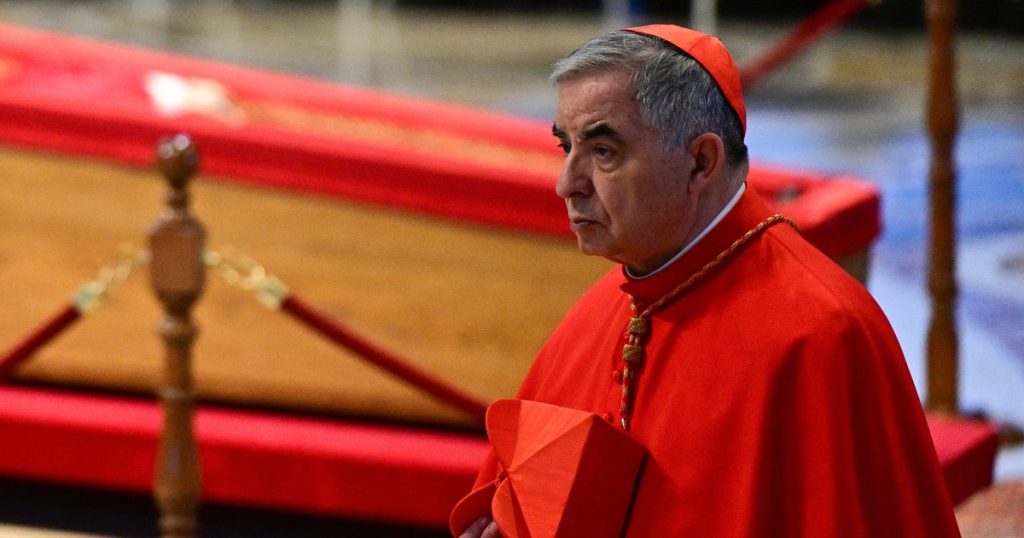In a surprising turn of events, Italian Cardinal Angelo Becciu has announced his withdrawal from participating in the upcoming conclave to elect a new pope. His decision comes in the wake of the passing of Pope Francis and is aimed at ensuring the good of the church, as discussions about Becciu’s eligibility had become a focal point. Following his conviction for fraud and embezzlement in 2023, questions surrounding his involvement in the conclave had cast a shadow over the proceedings, leading to this significant announcement.
| Article Subheadings |
|---|
| 1) Background of Cardinal Becciu |
| 2) The Trial and Its Implications |
| 3) The Impact of Becciu’s Withdrawal |
| 4) Letters from Pope Francis |
| 5) Questions Surrounding the Fairness of the Trial |
Background of Cardinal Becciu
Cardinal Angelo Becciu, born in 1948 in Pattada, Sardinia, rose to prominence within the Vatican, serving as one of Pope Francis’ top advisors until allegations of financial misconduct surfaced. Initially ordained in 1972, Becciu’s career gained momentum in 2011 when he was appointed by Pope Benedict XVI as Substitute for General Affairs in the Secretariat of State, making him one of the highest-ranking officials in the Vatican. In 2018, Pope Francis elevated him to cardinal status and appointed him as Prefect of the Congregation for the Causes of Saints. However, allegations of embezzlement and nepotism led to his downfall in 2020, culminating in his resignation from his cardinal duties.
The Trial and Its Implications
Becciu’s legal troubles came to a head in 2023 when he was convicted of embezzlement and fraud linked to the Vatican’s significant investment in a luxury apartment project in London. Prosecutors argued that Becciu, along with other officials, misappropriated funds and profited illegitimately from the investments made by the Holy See. His conviction, resulting in a five-and-a-half-year prison sentence, has raised questions about financial governance within the Vatican. Becciu maintains his innocence and has launched an appeal against his conviction, leading to ongoing discussions about the integrity of the trial itself.
The Impact of Becciu’s Withdrawal
Despite being under the age limit eligible to vote in the conclave, Becciu’s withdrawal does not alter the official numbers of cardinal electors as the Vatican had already classified him as a “non-elector.” The total number of cardinal electors stands at 135, but with a few other cardinals formally excusing themselves due to health reasons, the number of eligible voters is now reduced to 133. This situation underlines the complex dynamics at play within the Catholic Church as it approaches this pivotal transitional period.
Letters from Pope Francis
Reports indicate that Pope Francis sent two letters to Becciu prior to his death, suggesting he should refrain from participating in the conclave. Becciu’s decision to announce his withdrawal appears to have been influenced significantly by the contents of these letters. While the Vatican has kept the details of the communications under wraps, their existence points to a discernible tension between Becciu and the current papacy. This dynamic reflects the broader religious and administrative challenges within the Church as it seeks to navigate leadership transitions.
Questions Surrounding the Fairness of the Trial
The integrity of Becciu’s trial has been a subject of considerable scrutiny. Legal representatives for Becciu and other defendants allege that Pope Francis overstepped his authority and interfered with judicial proceedings, thus compromising the fairness of the trial. They argue that the witnesses were manipulated and evidence was suppressed. While the Vatican tribunal dismissed these claims, the implications carry weight as they raise broader questions about the interaction between the Pope’s authority and the legal processes within the Vatican.
| No. | Key Points |
|---|---|
| 1 | Cardinal Angelo Becciu has withdrawn from participating in the conclave following significant controversy surrounding his legal status. |
| 2 | Becciu was convicted in 2023 of fraud and embezzlement related to significant financial malpractice within the Vatican. |
| 3 | The Vatican has reduced the number of cardinal electors for the conclave due to several formal withdrawals, including Becciu’s. |
| 4 | Correspondence from Pope Francis played a critical role in Becciu’s decision to step down from the conclave. |
| 5 | Concerns regarding the fairness of Becciu’s trial highlight ongoing tensions in the Vatican surrounding governmental and judicial authority. |
Summary
The withdrawal of Cardinal Angelo Becciu from the upcoming conclave marks a significant moment in the Catholic Church’s leadership transition after the death of Pope Francis. His legal battles, culminating in a conviction for fraud and embezzlement, overshadow not only his personal journey but also stir broader conversations about governance and transparency within the Church. As the conclave approaches, multiple challenges remain evident, requiring careful navigation by those in positions of authority.
Frequently Asked Questions
Question: Who is Cardinal Angelo Becciu?
Cardinal Angelo Becciu was a prominent figure within the Vatican, serving as an advisor to Pope Francis until he faced allegations of embezzlement and fraud, which culminated in a conviction in 2023.
Question: What were the charges brought against Becciu?
Becciu was convicted of embezzlement and fraud related to a significant real estate investment, involving accusations of financial misconduct and improper use of Vatican funds.
Question: How has Becciu’s withdrawal affected the conclave?
While Becciu’s withdrawal does not change the Vatican’s official count of cardinal electors, it reflects the complex dynamics surrounding eligibility and governance within the Church as it transitions to new leadership.


